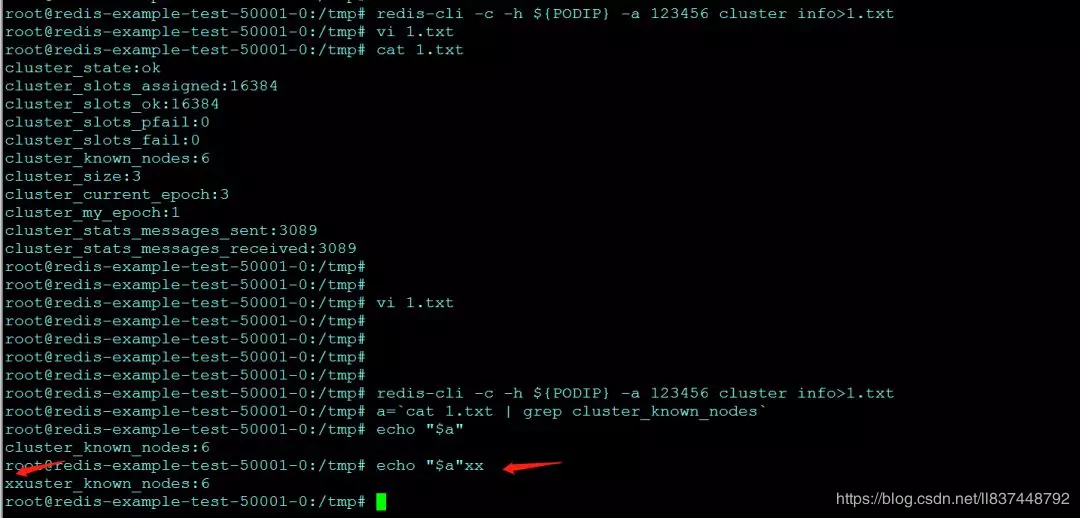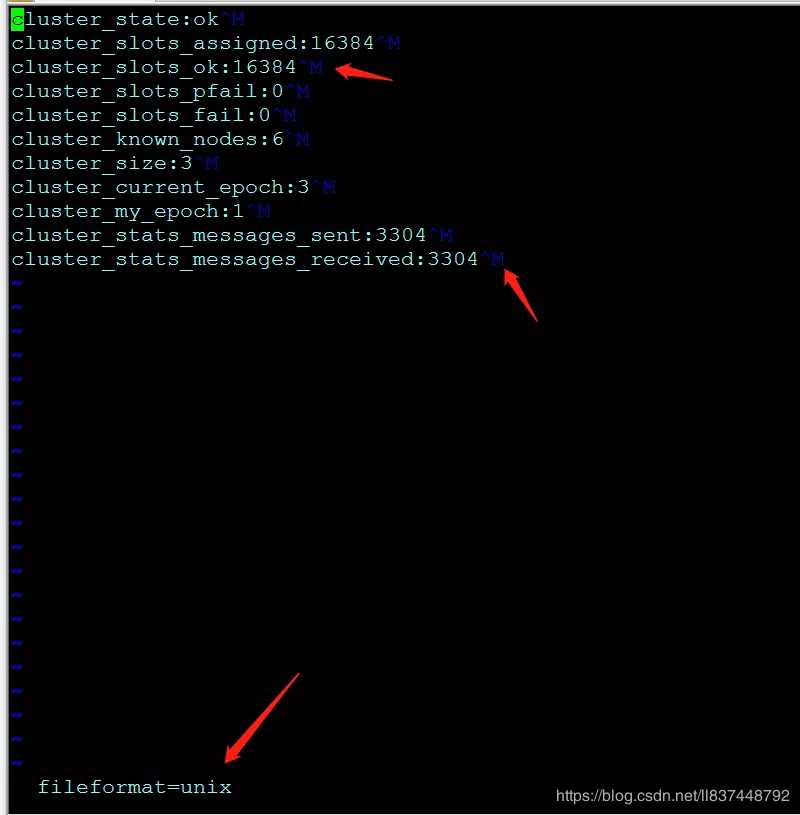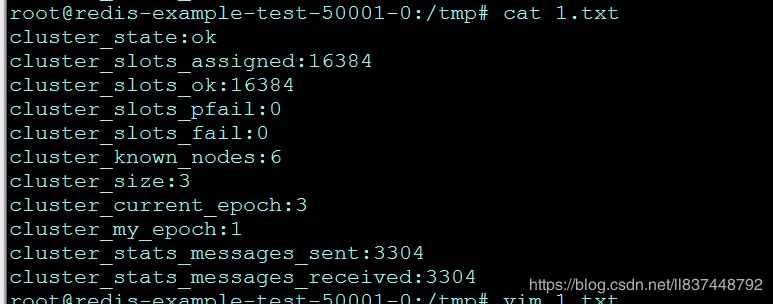本文首发于微信公众号“我的小碗汤”,扫码文末二维码即可关注,欢迎一起交流!
redis在容器化的过程中,涉及到纵向扩pod实例cpu、内存以及redis实例的maxmemory值,statefulset管理的pod需要重启。所以把redis集群的状态检查放到了健康检查中,依赖statefulset的原生能力(pod实例ready后才重启下一个,ready后endpoints controller将pod信息更新到endpoints资源对象中),而没有在redis operator中写逻辑去判断。
需要用redis-cli -h {redis实例IP} ping查看redis是否正常,同时用redis-cli -c -h {redis实例IP} -a {redis密码} cluster info输出的信息解析cluster_state的值是否为ok,以及cluster_known_nodes的值是否为1,判断redis集群是否正常;
如果redis集群刚创建,cluster_known_nodes为1,cluster_state为fail;
如果redis集群为纵向扩容(扩CPU、内存)升级重启,cluster_known_nodes不为1,cluster_state为ok时才认为集群正常,才能重启下一个pod。
因为涉及到字符串相等判断,所以用以下这样判断:
if [ "$cluster_known_nodes"x = "1"x ]; then
.....
fi
但是判断一直有问题,如下图,在$a后面加个x,会变为在开头覆盖式的加a,结果就是判断结果不相等。

把redis-cli -c -h {redis实例IP} -a {redis密码} cluster info执行的结果重定向到文件里。
vi 1.txt查看文件,在vi里用set ff命令查看文件格式为unix,但是文件每一行后面都有一个^M的特殊字符,这就是问题所在了。

最主要是通过cat都看不出来特殊字符的存在。

手动把^M特殊字符删掉就好了。

网上说^M是windows格式文本文件的换行符 ,可以用dos2unix命令转为unix格式。但是执行cluster info命令全程在linux中操作,而且重定向到文件中set ff命令看到也是unix格式。这点还是很费解。
先用sed命令将^M换掉,试了sed 's/^M//g'没有用,所以选择用sed 's? ??g'替换,最终脚本如下。
if语句的[[]]需要用bash执行,用sh执行会报错[[: not found
#!/bin/bash
#需要用redis-cli -h {redis实例IP} ping查看redis是否正常
#用redis-cli -c -h {redis实例IP} -a {redis密码} cluster info输出
#的信息解析cluster_state的值是否为ok,以及cluster_known_nodes的值是
#否为1,判断redis集群是否正常;如果redis集群刚创建,cluster_known_nodes
#为1,cluster_state为fail;如果redis集群为纵向扩容(扩CPU、内存)升级重启
#cluster_known_nodes不为1,cluster_state为ok时才认为集群正常,才能重启
#下一个pod,改健康检查脚本旨在维护升级时redis集群状态,不在operator中维护
# 利用好statefulset一个实例ready后重启下一个pod的特性
pingres=$(redis-cli -h $(hostname) ping)
# cluster_state:ok
# cluster_slots_assigned:16384
# cluster_slots_ok:16384
# cluster_slots_pfail:0
# cluster_slots_fail:0
# cluster_known_nodes:6
# cluster_size:3
# cluster_current_epoch:15
# cluster_my_epoch:12
# cluster_stats_messages_sent:270782059
# cluster_stats_messages_received:270732696
pingres=$(echo "${pingres}" | sed 's?
??g')
if [[ "$pingres"x = "PONG"x ]]; then
clusterinfo=$(redis-cli -c -h ${PODIP} cluster info)
# redis-cli -c -h ${PODIP} cluster info output info include ^M(win
) char lead to error, so use sed 's?
??g'
clusterknownnodes=$(echo "${clusterinfo}" | grep cluster_known_nodes | sed 's?
??g' | awk -F ':' '{print $2}')
clusterstate=$(echo "${clusterinfo}" | grep cluster_state | sed 's?
??g' | awk -F ':' '{print $2}')
echo "clusterknownnodes: ${clusterknownnodes} --- clusterstate: ${clusterstate}"
# [[ need run this script use /bin/bash instead of /bin/sh
# if语句的[[]]需要用bash执行,用sh执行会报错[[: not found
if [[ "${clusterknownnodes}"x = "1"x && "${clusterstate}"x = "ok"x ]]; then
echo "--1--"
exit 0
elif [[ "${clusterknownnodes}"x != "1"x && "${clusterstate}"x = "ok"x ]]; then
echo "--2--"
exit 0
# create redis cluster
elif [[ "${clusterknownnodes}"x = "1"x && "${clusterstate}"x != "ok"x ]]; then
echo "--3--"
exit 0
elif [[ "${clusterknownnodes}"x != "1"x && "${clusterstate}"x != "ok"x ]]; then
echo "--4--"
exit 1
else
echo "--5--"
exit 1
fi
else
exit 1
fi
一般这种怪异的问题都是脚本里有特殊字符造成的,可以在脚本中set list显示特殊字符。当然windows上编辑过的脚本在linux上运行一般dos2unix test.sh这样转换一下最好,免的遇到麻烦。
参考:
shell中括号的特殊用法 linux if多条件判断
https://www.cnblogs.com/jjzd/p/6397495.html
运行shell脚本时报错"[[ : not found"解决方法
https://www.cnblogs.com/han-1034683568/p/7211392.html
本公众号免费提供csdn下载服务,海量IT学习资源,如果你准备入IT坑,励志成为优秀的程序猿,那么这些资源很适合你,包括但不限于java、go、python、springcloud、elk、嵌入式 、大数据、面试资料、前端 等资源。同时我们组建了一个技术交流群,里面有很多大佬,会不定时分享技术文章,如果你想来一起学习提高,可以公众号后台回复【2】,免费邀请加技术交流群互相学习提高,会不定期分享编程IT相关资源。
扫码关注,精彩内容第一时间推给你
